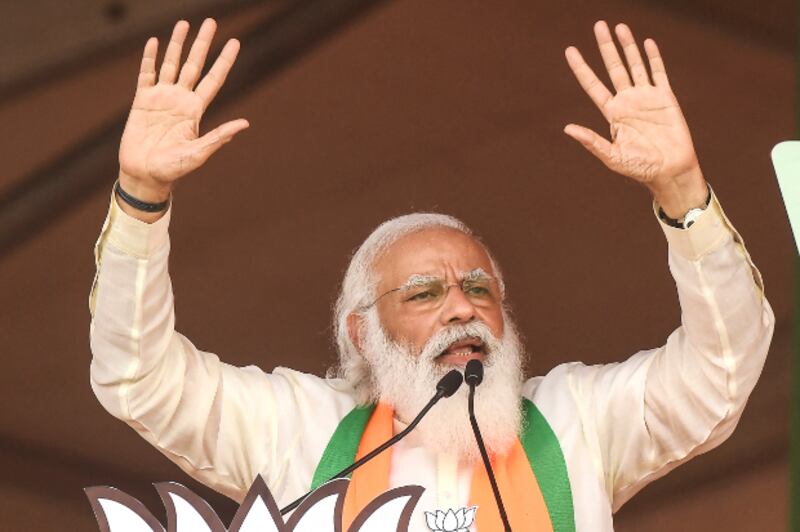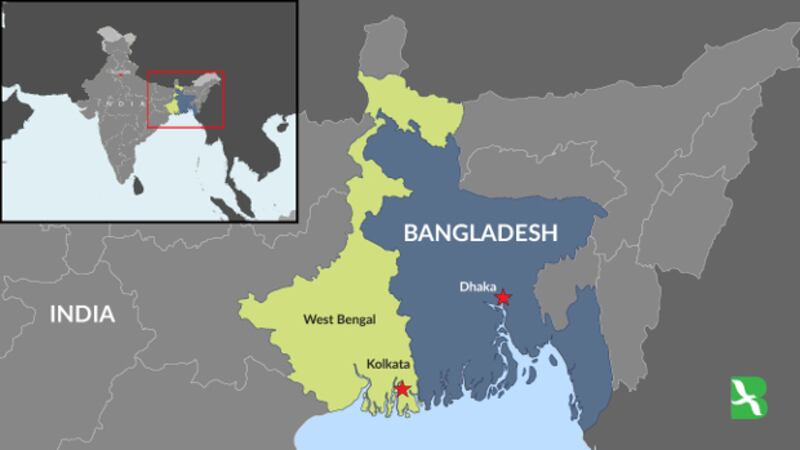India’s governing Hindu nationalist Bharatiya Janata Party is looking to cement its position in crucial polls starting this weekend in West Bengal, an eastern state where it has been shut out for decades.
Trinamool Congress (TMC), the party that controls the state legislature in West Bengal, is in for a tough fight because the BJP, which is in power at the center and in a majority of states along with allies, has vast resources and is determined to become the dominant party nationwide.
Three other states – Assam, Kerala and Tamil Nadu – and the Union Territory of Puducherry also go to the polls in the next two weeks.
But the battle royale is going to be in West Bengal, said Aditya Nigam, political theorist at New Delhi’s Center for the Study of Developing Societies, about the state where Chief Minister Mamata Banerjee has twice attempted a “secular” coalition of regional parties across India to form a front against Prime Minister Narendra Modi and his belligerently nationalist BJP.
“Having taken the chief ministerial route himself, Modi understands which chief ministers constitute a threat to his position in the future. Mamata is one of the key contenders in this respect,” Nigam told BenarNews, referring to strong regional leaders moving to the national stage.
Modi was chief minister of Gujarat for three consecutive terms, starting in 2001, and since then rose rapidly in the BJP’s ranks to become the prime ministerial candidate for the party in the 2014 general election. He steered a BJP-led alliance to an emphatic win in the national polls and won the next general election for the alliance in 2019.
Nigam said that if the TMC had won only 10-odd national parliamentary seats more in the 2019 election, Banerjee might have been a potential prime minister in a non-BJP alliance.
Therefore, the BJP sees the feisty, outspoken and charismatic Banerjee – the only woman in India to head a state government currently – as a serious obstacle in its ambition to dominate India nationwide.

India's Prime Minister Narendra Modi addresses supporters of the Bharatiya Janata Party during a rally ahead of the West Bengal state election at the Brigade Parade ground in Kolkata, March 7, 2021. [AFP]
Defectors ‘greedy and corrupt’
This time around, the West Bengal state election is a long drawn-out affair.
India’s Election Commission decided the election would be held in eight phases, from March 27 to April 29, making it the state’s longest election ever. Votes are scheduled to be counted on May 2.
The West Bengal legislature – called an Assembly – comprises 294 members, elected directly from single-seat constituencies. It sits for a term of five years, unless dissolved. A party needs to win a simple majority to win power – that is, 148 seats.
In the last state election, the TMC won a whopping 211 seats and the BJP a paltry three.
Now, though, the TMC holds 200 seats and the BJP 35, primarily owing to defections from other parties and a few by-election victories.
Among the TMC defections to the BJP were three of Banerjee’s trusted lieutenants, two of whom were implicated in a financial scam.
Unfazed, Banerjee called these defectors “greedy and corrupt.”
Observers note that the BJP doesn’t have a strong enough grassroots cadre or local leaders in West Bengal and defections are one way to get known faces in the party before the elections.
But BJP bigwig Amit Shah countered by saying that the TMC’s slogan, “Maa, Mati, Manush,” –which means “Mother, Motherland and Mankind” – has been reduced to “extortion, corruption and nepotism,” which is why people were leaving the party.
Banerjee’s opponents accuse TMC leaders of running coal, sand, extortion, and cattle smuggling rackets, involving state officials at every level.
Still, Maitra of the Indian Statistical Institute doesn’t believe corruption allegations would affect the TMC.
“In India, people expect politicians to be corrupt. I don’t see these allegations causing any fresh damage to the TMC,” he said.

The Muslim vote
One of the big reasons the BJP needs to win West Bengal is so it can successfully implement the Citizenship Amendment Act (CAA) it passed in 2019, said political theorist Nigam.
The controversial CAA aims to “grant Indian Citizenship to persons belonging to Hindu, Sikh, Buddhist, Jain, Parsi and Christian communities on ground of religious persecution in Pakistan, Afghanistan and Bangladesh,” for people who entered the country on or before Dec. 31, 2014, according to a government statement. Notably, the act leaves out Muslims.
The CAA is of particular relevance in West Bengal.
The state has a 2,545-mile international border with Bangladesh and shares with the country the language of Bengali, which has traditionally encouraged Bangladeshi immigrants and refugees to settle in the state. The BJP’s leaders have publicly spoken of the need to weed out Bangladeshi immigrants.
In the last state election, the TMC won 98 constituencies that have a significant Muslim population. Muslims constitute 27 percent of West Bengal’s population, and they are hoping that Banerjee can shield them from CAA’s close sibling, the National Register of Citizens, an official citizens’ list.
West Bengal’s neighbor, Assam, became the first Indian state to have an updated NRC – which was last drawn up in 1951 – and the final list left out nearly 2 million people comprising Bengali Hindus, Bengali Muslims, and other Hindus from various parts of India, many of whom have been housed in controversial detention camps.
In West Bengal, opponents of the CAA-NRC point to the Assam experiment, and fear a repeat in the state, claiming that the future of millions of Bengalis is in jeopardy, given Bengal’s large migrant and refugee population.
“Politically, a big reason for West Bengal’s importance to the BJP is its mandate to implement the CAA nationwide,” Nigam said.
Roiling matters is the case of West Bengal’s Hindu Matua community, a largely immigrant community from Bangladesh, that makes up between 17 and 20 percent of the state’s population, and which hopes to gain from the CAA.
The community’s leaders claim they can directly or indirectly influence the outcome in at least 70 of the 294 assembly seats.
Prime Minister Modi, on his two-day trip to Bangladesh on March 26-27, is making a special trip to a Matua temple in India’s neighbor. Many observers see this as a bid to win Matua votes in Bengal.
The BJP’s Amit Shah, who is India’s home minister, said last month that the Matua in West Bengal would soon be given citizenship.
Mamata, who is virulently anti-CAA, has been caught in a bind. She needs the Matua vote but does not want to implement the CAA.
At a rally in January, she claimed the Matua would lose their “land and identity” if the CAA were implemented.
“Why do you [Matua] need citizenship? You are already citizens,” she said, according to local news reports.
“I will never allow the BJP to implement CAA or NRC.”
Shailaja Neelakantan contributed to this report from Washington.
